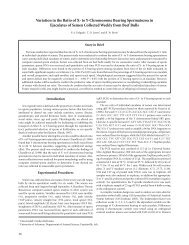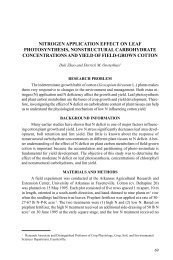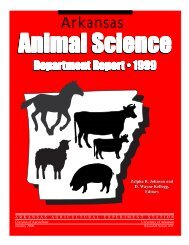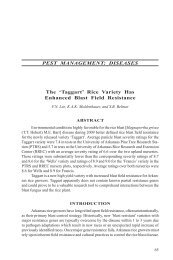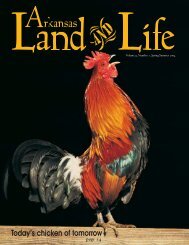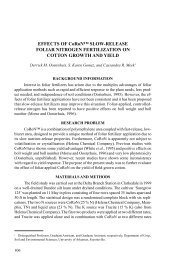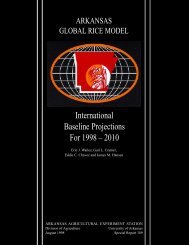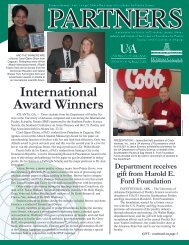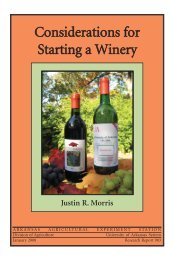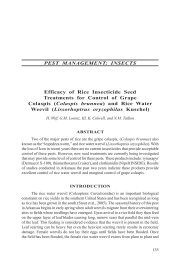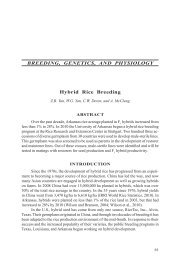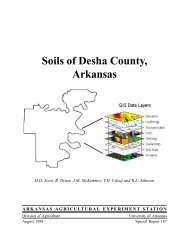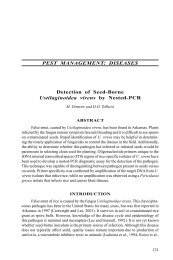Arkansas - Agricultural Communication Services - University of ...
Arkansas - Agricultural Communication Services - University of ...
Arkansas - Agricultural Communication Services - University of ...
You also want an ePaper? Increase the reach of your titles
YUMPU automatically turns print PDFs into web optimized ePapers that Google loves.
Influence <strong>of</strong> Fish Oil Addition on Growth Performance and<br />
Immune Function <strong>of</strong> Grazing Cattle<br />
T. J. Wistuba, E. B. Kegley, and J. K. Apple 1<br />
Story in Brief<br />
In the U.S., intake <strong>of</strong> n-3 fatty acids by humans is approximately 1.6 g/d, <strong>of</strong> which 1.4 g is α-linolenic acid (ALA;<br />
18:3) and 0.1 to 0.2 g is eicosapentaenoic acid (EPA; 20:5) and docosahexanoic acid (DHA; 22:6). The predominant<br />
sources <strong>of</strong> EPA and DHA are fish and fish oils. Inclusion <strong>of</strong> fish oil in ruminant diets may fortify the fatty acid composition<br />
<strong>of</strong> meats and modulate the immune system. Therefore, an experiment was conducted to determine the effects <strong>of</strong><br />
supplemental fish oil on growth performance and immune characteristics <strong>of</strong> beef calves. The experiment (78-d study)<br />
used 48 crossbred steers (509 ± 48.5 lb initial BW) grazing mixed grass pastures (n = 16). Steers were supplemented<br />
with 4 lb/d <strong>of</strong> one <strong>of</strong> four treatment supplements. Treatment supplements consisted <strong>of</strong>: 1) corn-based supplement; 2)<br />
corn-based supplement with 1.5% fish oil; 3) wheat midd-based supplement; and 4) wheat midd-based supplement with<br />
1.5% fish oil. Fish oil supplementation had a negative impact on ADG when added to the corn-based supplement and<br />
no effect when added to the wheat midd-based supplement (3.0 vs. 2.6 and 2.8 vs. 2.7 lb/d, respectively; base-supplement<br />
x fish oil interaction, P < 0.03). Isolated lymphocytes from calves fed the corn-based supplement with fish oil had<br />
a greater response to stimulation with concanavalin A than lymphocytes from calves fed the corn-based supplement, and<br />
there was no effect <strong>of</strong> fish oil addition to the wheat midd-based supplement (base-supplement x fish oil interaction, P <<br />
0.01). Fish oil supplementation in the current trial seemed to stimulate the immune system. However, the reduction in<br />
performance may limit its use as an immune stimulant and may limit the potential to use it for altering the fatty acid<br />
composition <strong>of</strong> meat.<br />
Introduction<br />
Fish industry by-products are potential sources <strong>of</strong> valuable<br />
nutrients. Therefore, methods <strong>of</strong> converting fish industry<br />
by-products into reliable sources <strong>of</strong> animal feeds would benefit<br />
both the fish and livestock industries. In the United<br />
States, intake by humans <strong>of</strong> n-3 fatty acids is approximately<br />
1.6 g/d, <strong>of</strong> which 1.4 g is α-linolenic acid (ALA; 18:3) and<br />
0.1 to 0.2 g is eicosapentaenoic acid (EPA; 20:5) and docosahexanoic<br />
acid (DHA; 22:6) (Kris-Etherton et al., 2000). The<br />
predominant sources <strong>of</strong> EPA and DHA are fish and fish oils.<br />
Recently, the dietary recommendation for the highly unsaturated<br />
n-3 fatty acids has increased, specifically EPA and<br />
DHA, from 0.15 to 0.65 g/d. To achieve this four-fold<br />
increase in consumption, consumers will either have to adjust<br />
their diets, or the nutrient content <strong>of</strong> certain foodstuffs may be<br />
able to be changed. However, feeding diets that alter the fatty<br />
acid content <strong>of</strong> meat may also affect other aspects <strong>of</strong> beef production.<br />
Theis et al. (1999) reported that dietary fish oils may<br />
have a negative impact on immune function and fatty acid<br />
composition in pigs. The objective <strong>of</strong> this study was to determine<br />
the effects <strong>of</strong> dietary fish oil addition on growth and<br />
immune function <strong>of</strong> cattle consuming a forage based diet.<br />
Materials and Methods<br />
Forty-eight steers (509 ± 48.5 lb initial BW) were<br />
obtained from the <strong>University</strong> Livestock and Forestry Branch<br />
Station in Batesville. Steers were shipped to the <strong>University</strong> <strong>of</strong><br />
<strong>Arkansas</strong> Stocker and Receiving Unit in Savoy prior to the<br />
start <strong>of</strong> the study. Calves were weighed upon arrival, blocked<br />
by weight (four blocks) and randomly assigned to pens. There<br />
were three steers in each <strong>of</strong> the 16 pens, for a total <strong>of</strong> 12 animals<br />
per treatment. Pens were 1.1 acre mixed grass pastures.<br />
Supplements were fed at a rate <strong>of</strong> 4.0 lb/d. Treatment supplements<br />
(Table 1) consisted <strong>of</strong>: 1) corn-based supplement; 2)<br />
corn-based supplement with 1.5% fish oil; 3) wheat middbased<br />
supplement; and 4) wheat midd-based supplement with<br />
1.5% fish oil. The diets were mixed at approximately weekly<br />
intervals.<br />
Steers were fed their respective diets for 78 d. Steers<br />
were weighed on day 0, 14, 28, 42, 56, and 78 and were<br />
observed daily for signs <strong>of</strong> clinical disease. Steers were<br />
weighed on consecutive days at d 0 and 78 to start and finish<br />
the trial. On d 78 <strong>of</strong> the study, all calves were bled by jugular<br />
venipuncture, and blastogenic response <strong>of</strong> peripheral lymphocytes<br />
to phytohemagglutinin (PHA; Sigma Chemical Co.,<br />
St. Louis, MO), concanavalin A (CONA; Sigma Chemical<br />
Co.) and pokeweed mitogen (PWM; Sigma Chemical Co.)<br />
1 All authors are associated with the Department <strong>of</strong> Animal Science, Fayetteville.<br />
63



